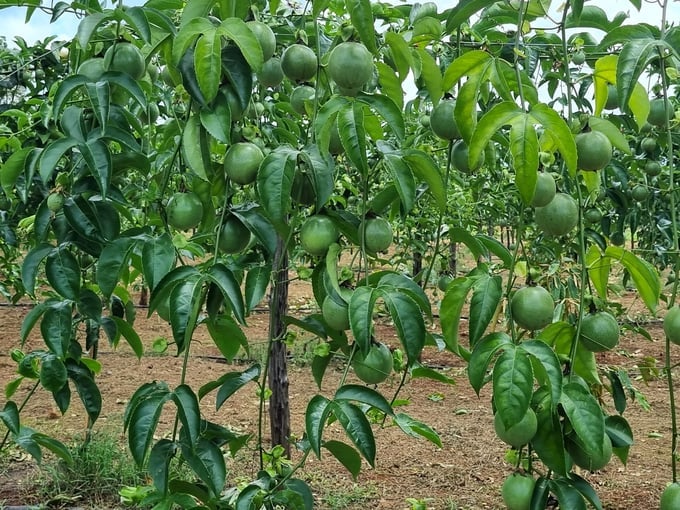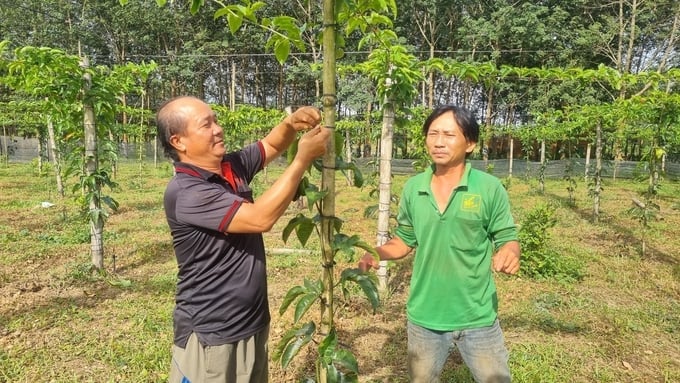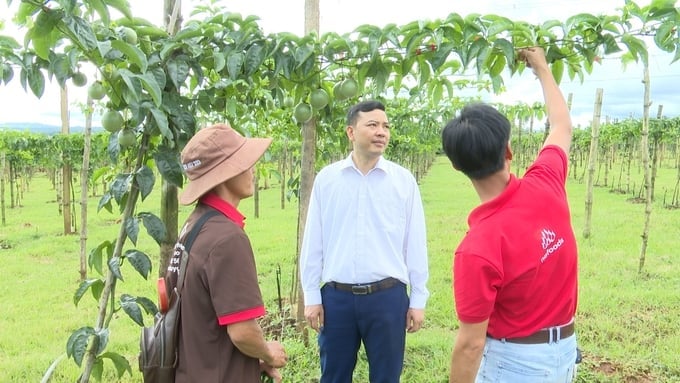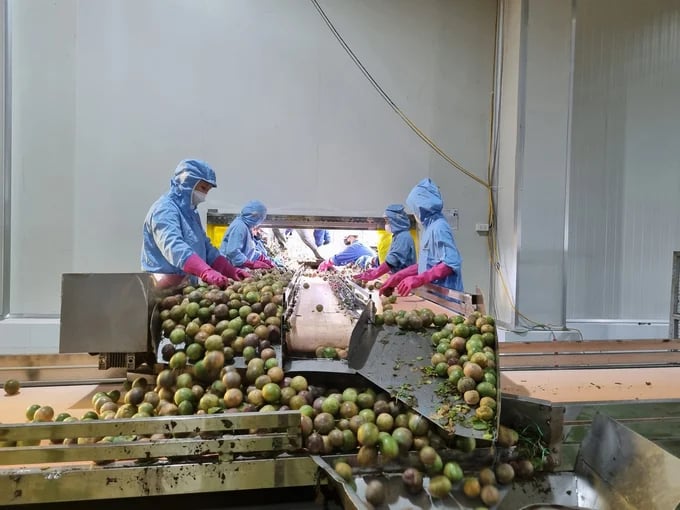May 28, 2025 | 19:54 GMT +7
May 28, 2025 | 19:54 GMT +7
Hotline: 0913.378.918
May 28, 2025 | 19:54 GMT +7
Hotline: 0913.378.918
Key passion fruit growing areas in Gia Lai province were once lush and profitable passion fruit gardens, but they are now abandoned and neglected. These gardens, which used to yield considerable profits, have now deteriorated, with some owners ceasing care altogether. In some cases, the land beneath the passion fruit trellises is used for short-term crops like corn and beans.

While passion fruit cultivation is strong in Gia Lai, it lacks a structured chain of connections. Photo: Dang Lam.
Ia Grai, one of Gia Lai's primary passion fruit districts spanning about 1,000 hectares, had vibrant passion fruit gardens about six months ago. People were actively engaged in pruning, fertilizing, and harvesting due to the high buying price of passion fruit at 20,000 VND/kg or even more. Groups of individuals joyfully harvested the large, round lemons, transporting them to collection points in convoys of vehicles.
However, the situation has drastically changed. From the heart of the Ia Grai district through key passion fruit-growing communes like Ia H'rung and Ia Ba, the atmosphere is now bleak. Many passion fruit gardens have withered, overrun by grass. Some plots now host short-term crops, while others have been abandoned, with only cows grazing amid the once thriving passion fruit plants.
During a morning walk, I encountered Mr. Vo Thanh Son, a farmer from Chu Hau 6 village in Ia Ba commune, diligently sowing peanuts on land that was previously a passion fruit plantation. He shared that after two seasons of plummeting lemon prices (down to 2,000 VND/kg), he was forced to replace the passion fruit trees with peanuts since the returns didn’t cover the harvesting expenses.
Mr. Son further explained that his family had initially replaced old coffee trees with passion fruit due to high prices. However, with the recent price drop, they had to convert a portion of the land to peanut cultivation. They still tend to a remaining passion fruit garden, hoping for better times and higher prices in the future.

Many households primarily follow the trend of growing passion fruit. Photo: Dang Lam.
When questioned about collaboration in passion fruit cultivation, Mr. Son expressed that they merely acquire seeds and fertilizer from cooperatives or distribution points. They sell the harvest to traders and haven't heard of joint production discussions.
Continuing to Chu Pah district, another major passion fruit area, I visited Pang village in Ia Nhin commune. There, Ms. Ro Cham K're and her husband were weeding a 1,000m2 passion fruit garden. Under the passion fruit canopy, they were cultivating coffee trees, recently planted this year.
Ms. Ro Cham K're mentioned that even though passion fruit prices are declining, they continue to weed and fertilize. Their primary focus, however, is nurturing the newly replanted coffee garden, while passion fruit is a secondary pursuit.
When asked about affiliations with businesses or cooperatives in passion fruit cultivation, Ms. Ro Cham K're looked perplexed and inquired about the term "association."
Without affiliations, growing passion fruit becomes a matter of chance. Consequently, when passion fruit prices plummet, farmers shoulder the burden alone.
According to the Gia Lai Department of Agriculture and Rural Development, collaboration and linkage between businesses, cooperatives, and farmers in the passion fruit industry remain unsustainable, predominantly centered on buying and selling agreements. The involvement of parties in the value chain remains limited, particularly in the role of passion fruit processing enterprises for maintaining and developing passion fruit raw material areas sustainably.
Thong Do International Joint Stock Company is among the few pioneers in producing high-quality passion fruit varieties. In 2021, the company began constructing phase 1 of the High-Quality Plant Seed Center in Chu Puh district, now capable of producing over 20 million passion fruit seedlings annually.
However, Mr. Le Van Tuyen, the General Director, mentioned that the company solely provides high-quality climbing varieties to farmers through cooperatives and local connections, lacking direct engagement with individuals.
As part of a multinational corporation, Quicornac Co., Ltd. operates a factory in Tra Da Industrial Park with a production capacity of 500 tons of fresh fruit per day. Mr. Luu Quoc Thanh, the General Director of Quicornac Gia Lai Company, highlighted that their strategy doesn't involve direct connections or investments. Instead, their strength lies in transparent and fair payment procedures, ensuring quick payments within three days of delivery. He stressed the importance of clear regulations in affiliated programs to prevent factory and farmer losses.

Emphasizing the significance of production and consumption connections for the industry's sustainability. Photo: Dang Lam.
The Ia Mo Nong Production - Trade - Service and Tourism Cooperative in Chu Pah district directly collaborates with farmers in passion fruit cultivation. Mr. Le Van Thanh, the Cooperative's Director, mentioned their association with over 100 households across 180-200 hectares. They provide seeds and fertilizer and later purchase the harvest, deducting costs paid by farmers at the start of the season.
“Organizing partnerships with farmers for passion fruit cultivation at least brings some positive effects, helping households facing initial capital difficulties by providing necessary resources," Mr. Thanh concluded.

Connecting production and consumption is highlighted as a crucial and sustainable approach for the passion fruit industry. Photo: Dang Lam.
In Chu Pah district, Gia Lai province, the Ia Mo Nong Production - Trade - Service and Tourism Cooperative stands out as one of the few organized entities directly collaborating with farmers in the cultivation of passion fruit. Mr. Le Van Thanh, the Cooperative's Director, emphasized that the unit has established partnerships with over 100 households spanning an area of approximately 180-200 hectares. This partnership model involves receiving seeds from seed production units and supplying them to farmers. Moreover, the cooperative offers fertilizers to those in need. At the time of harvest, the cooperative procures the produce and transports it to the processing facility. The expenses for fertilizers and seeds, paid by farmers at the commencement of the season, are then deducted.
Mr. Thanh highlighted the positive impact of organizing partnerships for passion fruit cultivation, particularly in alleviating initial capital challenges by providing seeds and fertilizers, which are subsequently deducted during harvesting. This approach ensures a stable output, providing reassurance to the people involved in the process.
Translated by Quynh Chi
/2025/05/25/4127-3-073637_820.jpg)
(VAN) Thanks to the promotion from an FAO-implemented project, vegetable production in greenhouses in Moc Chau has seen strong development, from 1.5 hectares in 2021 to nearly 50 hectares in 2024.

(VAN) FAO has recently supported USD 140,000 to implement the project 'Risk mitigation human-animal interface risks through disease control initiatives in pig farming.'

(VAN) The People's Committee of Tra Vinh province has approved an adjustment to the investment policy for the Green Hydrogen Plant project, increasing its area to approximately 52.76 hectares.
![Reducing emissions from rice fields: [2] Farmers’ commitment to the soil](https://t.ex-cdn.com/nongnghiepmoitruong.vn/608w/files/news/2025/05/05/dsc08881jpg-nongnghiep-140632.jpg)
(VAN) Clean rice cultivation model in Thuong Tan commune, Bac Tan Uyen district, is assisting local residents in achieving sustainable agriculture by substantially reducing costs, increasing productivity, and protecting the environment.

(VAN) At the conference to disseminate Resolution No. 68, AgriS introduced its digital agricultural ecosystem and reaffirmed its commitment to accompanying the Government in promoting private sector development and sustainable agriculture.

(VAN) 'Blue Ocean - Blue Foods' initiative is designed to restore marine ecosystems and establish sustainable livelihoods for local communities by cultivating a minimum of 1,000 hectares of cottonii seaweed in the first three years.
/2025/05/21/4642-3-112707_603.jpg)
(VAN) The V-SCOPE project has made direct contributions to three out of six pillars of the Comprehensive Strategic Partnership between Vietnam and Australia.